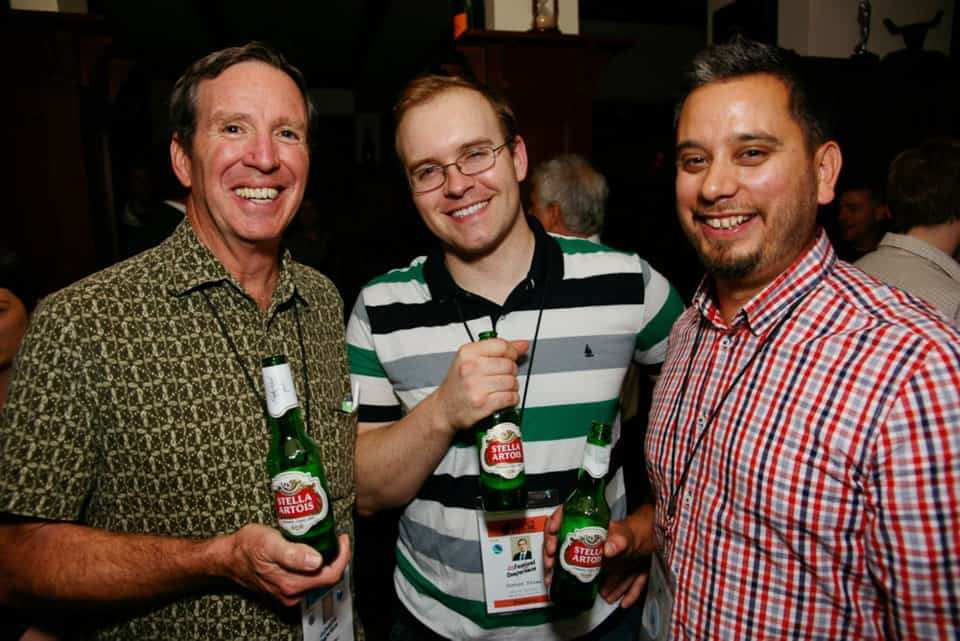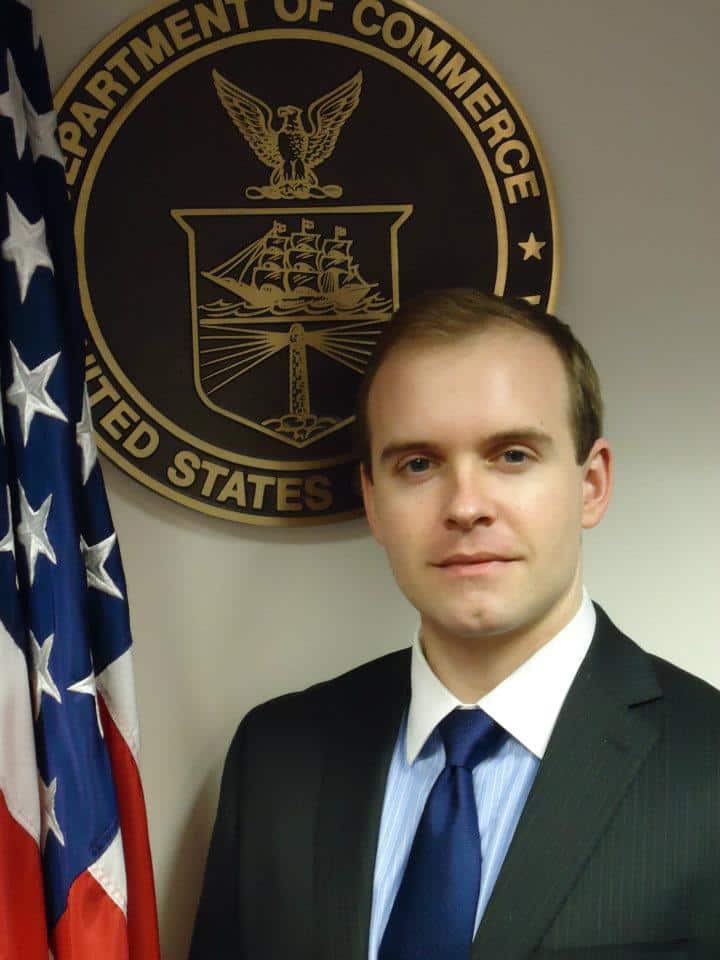
To fully experience everything that happens at the Austin Film Festival you need stamina and a willingness to just go for it – meaning, a movie is starting at 6PM that you know nothing about and there’s a party right after it but you just got out of panel and you stop to think, ‘Did I eat lunch yet?’ and of course you haven’t. You buddy up with a few perfect strangers and head to the theater because you know that popcorn is a decent lunch anyway.
My own stamina and willingness would falter, but there was always something there to inspire me to keep going. Wake up early, stay out late. Nonstop. One of the inspirations was fellow writer and second rounder at the festival, Justin Sloan. We met at the first opening afternoon party and he’d be the impetus for many a late night.
Justin is a former Marine and former actor who works for the Federal Reserve doing something major with finance and Asia, a career that is far over my head, but just understood enough to make me feel like an inadequate underachiever. He also happens to write screenplays and novels in his spare time that have placed in various contests and festivals.
Part of what made the Austin Film Festival such a great experience was meeting other writers like Justin Sloan, where we can congregate and share our experiences, struggles, and goals. Rushing through the streets of Austin talking writing definitely adds a spark to the already burning fire inside, the one that keeps you writing and creating when the world only offers reasons to extinguish and move on.
I caught up with Justin to talk projects, contests, and fitting writing between the gaps of family and career.
ET: You were in the Marine Corps for five years before attending the School of Advanced International Studies at Johns Hopkins University. Did you join the Marines right out of high school? Was that a hard decision? Was there a plan in play there?
JS: When I graduated high school I thought I could either try to go to college on student loans to study art, or go with my best friend to join the Marines and figure out college later. I was under the impression that it is unrealistic to pursue one’s artistic passions, which led me to the choice to join the Marines.
I left the day after graduating high school and it was in many ways a great experience. However, now I’ve reached a point in my life where I realize that we should follow our passions. To try to ignore them to fit into society and have a normal job may lead to a satisfied life, but it leaves something wanting. I certainly do not regret joining the Marines as that experience brought me into acting and is a large part of my motivation when writing. But it was a tough five years!
The SAIS program at Johns Hopkins is an incredibly difficult program to be accepted into. What attracted you to apply?
I studied abroad in Japan in my senior year at the University of California, San Diego. Once again I was faced with how to obtain a normal nine to five job that could support a family, so I decided to apply to graduate schools. Another factor in play was the fact that I was enlisted in the military, not an officer. This meant people who knew nothing but had degrees were telling me what to do!
Naturally I had an inferiority complex, so I decided to go after all the education I could. I even considered PhD programs for a while, but realized that energy could go into writing fiction instead, and therefore decided to stop after my SAIS degree.
At the time I applied, I had high aspirations of working at the Treasury Department or Federal Reserve as an Asia analyst (I am doing the latter now). It worked and I feel incredibly blessed. And of course there was the fact that SAIS allows the first year of graduate school to be in Bologna, Italy. How could I pass up that opportunity?
Like the Marines, this experience has influenced my writing and one of my scripts takes place partially in Bologna. Everything somehow works its way into the writing.
A career at the Federal Reserve is a pretty major deal. I mean, some people work incredibly hard just to reach that point. Since having met you at the Austin Film Festival I’ve seen that you put just as much effort into your writing. Is the plan to have two careers, or is writing the ultimate goal?
I thought long and hard about this question, and at the moment I lean towards a two track life style. Instead of one or the other, putting all my energy into writing or my career at the Federal Reserve, why not just work twice as hard and do both? So that is indeed the plan.
The hard part is that now I have a newborn daughter, so I have to stretch myself in three directions – it hurts! If someday I am incredibly successful as a writer of fiction and screenplays, I would have to enter into a new stage of life-pondering and make a decision at that point. But for now, having a job that has nothing to do with writing fiction certainly gives me experiences that can influence my fiction and time spent wishing I could write, so that when I do write I am incredibly enthusiastic about it.
I saw the other day a quote about sitting down to write being difficult and I have to say I completely disagree – it is those moments spent not writing that are difficult because we want to write so bad.
Yeah, by time I get home from work and finish up whatever chores there are to do around the house, sitting down to write is a great feeling. How do balance your career and family while still finding time to write?
Writing with a child is tough! Craig Mazin and John August discuss this on their Scriptnotes podcast, and I have to agree. There are no more writing until three in the morning marathons. If I am lucky I get some time in the evenings and weekends, but I make sure to wake up early every day and get in about thirty minutes of revision in the morning before leaving for work, and then another thirty minutes of writing on the Bart on my way to work. It is tough, but I am still making progress. And of course, having a daughter is amazing and inspiring.
I remember Ashley Edward Miller (Thor, X-Men: First Class) saying that if his kid wakes up at 6:30AM, he gets up at 4:30AM to write. I’m not much of an early riser, but when a kid comes my way I’m planning on changing that.
You spent some time as an actor. How does that fit into the timeline between the Marine Corps, Johns Hopkins, and now? Is that something that you’re still pursuing, or have you moved on?
My time as an actor actually came about because of the Marine Corps. Marines that went to boot camp in San Diego are called ‘Hollywood Marines’ by some, and I certainly lived up to that. One of my supervisors, a Major, was an activated reservist after the early post-9-11 days. His full time job when not working with the Marines was as an actor. He had small parts in movies like ‘Bruce Almighty,’ and had a nice career in small budget horror movies.
He told me something I had not realized about Hollywood, which was that you don’t have to be super attractive or tall or all that jazz to be an actor. So my coworker and I started going to auditions and taking acting classes. We had a blast! I was in at least ten student and independent films, including my one IMDB credit on a film titled ‘Alien Abduction.’ I only had three lines in that one, and at the time it came out I had finished my five years in the Marines and had to decide whether to continue trying to act or study abroad in Japan.
I had always loved Japan, and decided I could always come back to acting. So I went off to spend a year in Tokyo, where I did a few small acting gigs. Unfortunately, the acting slowly faded from my life as I focused my energy towards finding a career. I can’t say I won’t go back to it someday. I loved acting almost as much as I love to write.
When you begin a script how concerned are you with its commercial appeal? What audience do you consider the priority – the script readers of competitions, potential filmmakers, or the end user who will hopefully see the film on the screen?
What a tough question! When I approach a script or a novel or any writing endeavor, it is much less about the commercial appeal for me than it is about a burning need to write the story. By the time I sit down to write, the story has been marinating in my brain (and in various notebooks and computer files) for quite some time. So I write the story I want to write, and then on the rewrite I tend to think about the scenes in terms of what would a script reader say.
In that sense I suppose my writing has meandered towards catering to the readers, but I recently started writing a script on Japan that deals with a guy running away from America because he does not know how to deal with the fact that a girl he loves has cancer. I am writing it how I want, script readers be darned! And if it doesn’t sell, I write it as a novel and sell that. So it varies for me in that I will write some scripts with more of a commercial angle in mind, and some for the artistic, passionate side of myself.
Beyond entering script competitions, you’ve really put your work out there and two of your scripts are in the process of being made. How did you go about getting your scripts in the hands of filmmakers?
To once again refer to Scriptnotes, Craig Mazin always says to not write for free. But guess what Mr. Mazin, some of us cannot get a start in the business or see our movies get made if we don’t start from such a lowly place as working for free. That is what I have done.
I actually answered an ad in Craigslist to work on a webisode, and when the producer liked my work he asked if I would be interested in collaborating on a feature with him. I first clarified the likelihood of the film getting made. He assured me (as did his credits on IMDB), that it would get made as long as I did a good job and we wrote history!
Okay, we wrote a micro-budget horror, but it was a fun experience and I look forward to seeing how it turns out.
On other scripts I have been receiving read requests through posting my information on MovieBytes.com, winning screenplay contests such as ScriptVamp and The-Greenlight and placing well in Page, Austin, and Creative World Awards, and querying. I am also trying the new Blacklist service, and have my fingers crossed.
In a way my fiction writing is another way I am working to get my scripts out there. My novel version of ‘Bringer of Light,’ which I also have in screenplay (logline on www.JustinMSloan.com), is in the final round of the San Francisco Writers Conference writing contest, and still in the running. If the story works, I prefer to write it as a screenplay and a novel, because (a) who knows which will sell first, and (b) they are so different it is like exploring your characters all over again but from different angles.
What was the conference like?
The San Francisco Writers Conference was amazing! It was four days of meeting wonderful agents, editors, and fellow authors. I was very surprised at how approachable and friendly all the agents and everyone were, and I will definitely be back next year. I left feeling very inspired, and with several requests for my middle grade novel ‘Bringer of Light.’ I have adopted this novel into a screenplay as well, and it was a finalist in last year’s Reel Authors screenplay contest.
We were both in Austin for the Austin Film Festival, and my mind changes constantly about my time there. It was a total blast, but overall I can’t say helped, other than to reiterate the fact that we all already know — making a career as a screenwriter is near impossible. What did you think of the festival? Is it something that you would do again?
While I can’t say attending the Austin Film Festival one time brought my writing career to a new level, I didn’t expect it to. But I made some contacts and I loved the experience. I will certainly return, because I believe it is a great place to be inspired and I hope that making those contacts and continuing to attend each year will help my career.
Since I hope to have a published novel and a produced movie when I go this year, I wonder if the experience will be different. Making it as a screenwriter may be tough, especially if that is all one does, but it is 100 percent impossible if we don’t try at all. So I am going to keep writing and make sure to attend the Austin Film Festival every year. I can’t wait for the next one!
One of your projects in pre-production is the feature ‘LIVE BAIT.’ How’d you find that project?
‘Live Bait’ came about from a Craigslist ad. I recommend that your readers be selective though – it seems like 50 percent of those are scams and another 49 percent may or may not actually get your film made. I could be wrong, I hope the odds are better.
I’ve never check Craigslist for filmmakers, but you’re a lot braver than I am. What’s the process like? Are you working from an idea of yours or the filmmakers?
On this script the director/producer came to me with a two paragraph outline of what he was going for and some of the first act written. I asked if I could go my own way with it and revise as I saw fit, and he gave me the go ahead. This is important when working with someone else’s idea, you have to be able to make it your own in some way. So I set out to do a sort of ‘American Pie’ meets ‘From Dusk Till Dawn’ (there are no vampires, but something evil and in some ways similar). Given the extremely small budget the film may not live up to those films, but I have faith in my director that it will be great for what it is.
You’re also rewriting a short script of yours for another group of filmmakers. How close are you to getting that one up and running?
My short script is very exciting for me because it has been dancing around in the confines of my brain for so long. It finally hit the paper and I love it! Luckily it seems some of the members of this group of filmmakers does too. We met in early February and they seem likely to make the film and even let me direct (I may co-direct as I have never directed before). Keep an eye on my website for updates!
How involved are you in the production of both of these films? Do you plan on being on set?
The great thing about working with both these groups is the people. They are very collaborative and open to ideas. James Tucker is doing my feature film and told me I can come down to LA and be on set, and as I mentioned I may actually direct the short. My roadblocks come from the fact that I have a family and a two month old daughter and that I live in Northern California. That is something we shall have to remedy, isn’t it?
It’s awesome that you have so many projects in the works. Do you have any interest in producing some of your work yourself? Doing all the funding, producing, casting, etc.?
As a writer, my interest lies primarily in writing. That said, I am working with some filmmakers to produce a short I wrote and may direct. A short seems to be a good reference tool, like a business card you can post online and point others to. I also hope it gets into film festivals like Austin and therefore serve as another talking point. Who knows, maybe someone will see it and approach me about writing a feature? But when it comes to feature films, my plan is to stick to writing them and see what happens.
Beyond scripts you also write fiction and have had your short stories published. How do you choose if a story idea is better off as a short story versus a script?
When considering the canvas for a story I generally approach it with this question in mind: Is this an internal or external story? Meaning, to tell this story do I have to really get into the head of the character, or is this something I can tell through action and dialogue?
I wrote a short story I am trying to get published, based on my cousin who committed suicide. I try to get into the character’s mindset and show how estranged she is, how cut off from the sense of family she enjoyed as a child. Could this be done in a feature film? Sure, probably, but it is not the sort of film I enjoy writing and the goal is served much better in a ten to fifteen page short story, in my opinion.
I mentioned earlier the script I am writing on Japan, and you may be thinking that story would be better as a novel or short story. But for me that story is a visual piece, better told through the images of the man’s life and his struggles. Considering it now, I see it is a fine line. I have also recently delved into poetry, and that is a different ball game altogether. Poetry is tough!
In film, you can hook up with filmmakers to get the project moving, as you’ve been doing. For fiction there doesn’t seem to a route like that outside of self-publishing. Have you ever considered publishing a novel yourself?
I would be much more open to creating my own films than self-publishing my novels or short stories (more so with novels). At the San Francisco Writers Conference there was a lot of hype about self-publishing. It seems to work for some people. But I want to stick to the traditional publishing route. I want a large press to edit my novel and have someone design the cover. I want to use their name when I try to get on panels at writers conferences, not be one of who knows how many people that are self-published.
I want an agent and publisher working with me to make my product the best it can be, and maybe help me sell the film rights. Anyone can self-publish, and some people are very successful at it. But it requires just as much work, if not more. And if no agents or publishers want to publish your book, do you really think the public is going to be enthusiastic about it? I’ve talked to too many people who have self-published and a year later they have only sold six copies! So my advice to other writers would be to keep writing, keep submitting, and go the traditional route. If you have written ten books and are still having no luck, then sure, self-publish and flood the market with your material to prove me wrong.
I definitely see your point. There’s also an element of validation when someone says, ‘this is good and I want to publish it.’ Gives you a sense that you might actually become a professional. Like doing well in a competition.
One thing I’ve noticed about how you work is the constant movement of your projects. You always have something going on — from writing groups to meetings with filmmakers. At the Austin Film Festival you were at every party and used each moment there to be involved in anything you could. You can see that level of work as well from your time as a Marine, in SAIS, and your acting and career in finance. What keeps this drive of yours going? What keeps you inspired?
I’ve never been incredibly smart, some may even call me slow (I know who you all are). But one thing I’ve never been accused of is lacking passion and ambition. I need to believe that if we struggle and never give up we can succeed, because otherwise so many of us are doomed. When I look at other people’s success stories, I see this is true!
And when I look back at my life so far, I believe I have demonstrated that to an extent – but not enough. So in part I suppose I work hard to prove to the world that yet another kid from a divorced family of mediocre income can make it.
And then of course there is simply the desire to create. I used to kickbox and I loved it, but at the end of the day what do I have to show for it? A video on Youtube of me kicking some guy’s butt and hips that will hurt me until the day I die. But with writing and academic pursuits we can leave something behind for others to enjoy. We can make a difference. Is that too corny?
No, I get it. I always picture being an old man going through boxes in a garage and going, ‘I made that. And that. And this.’ Leaving something behind that can’t be denied.
Being involved with Bay Are filmmakers already, how concerned are you with the idea of Los Angeles? Is the prospect of moving to LA attractive to you right now?
Ah, the simple question. I am moving to LA. Done. I met Ashley Miller at the Austin Film Festival and he was one of many people that told me if I am serious about writing film, I have to be in LA. There seems to be a consensus that you may be able to do it outside of LA, but you have to be willing to travel to LA all the time. With a family I am not willing to travel and be away from my beautiful wife and awesome daughter, so LA here we come!




Chris, can you believe it has been two years? Wow! Thanks for the interview again, I hope your writing is going well!
If only I could compose submissions this good. I’ve been working hard at it for about eight weeks today and I’m improving but I can’t wait until I’m just as good as you.